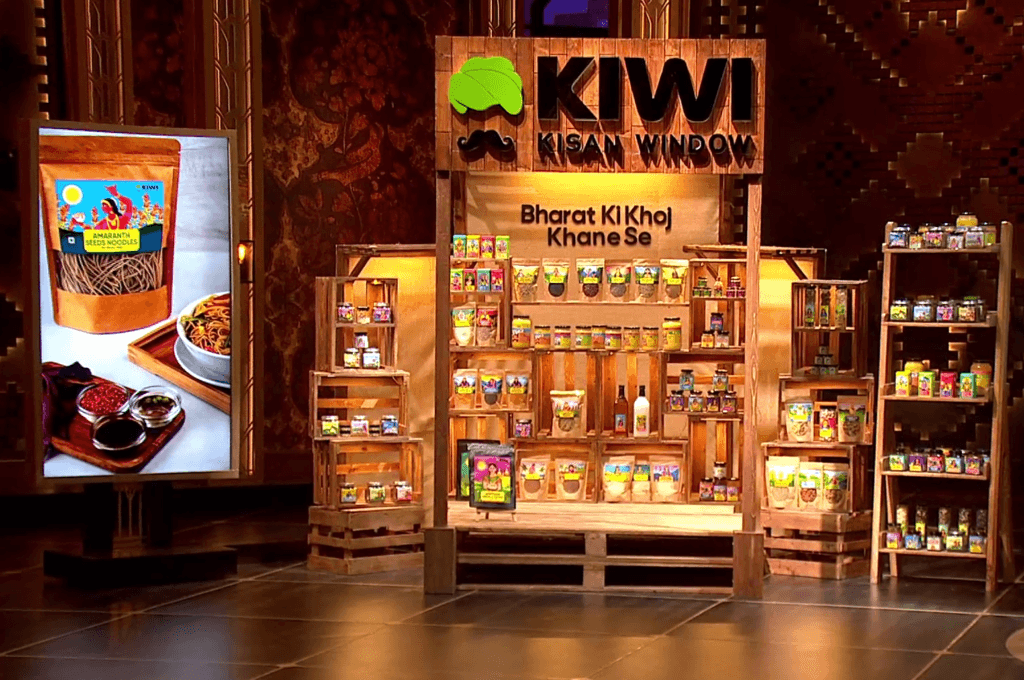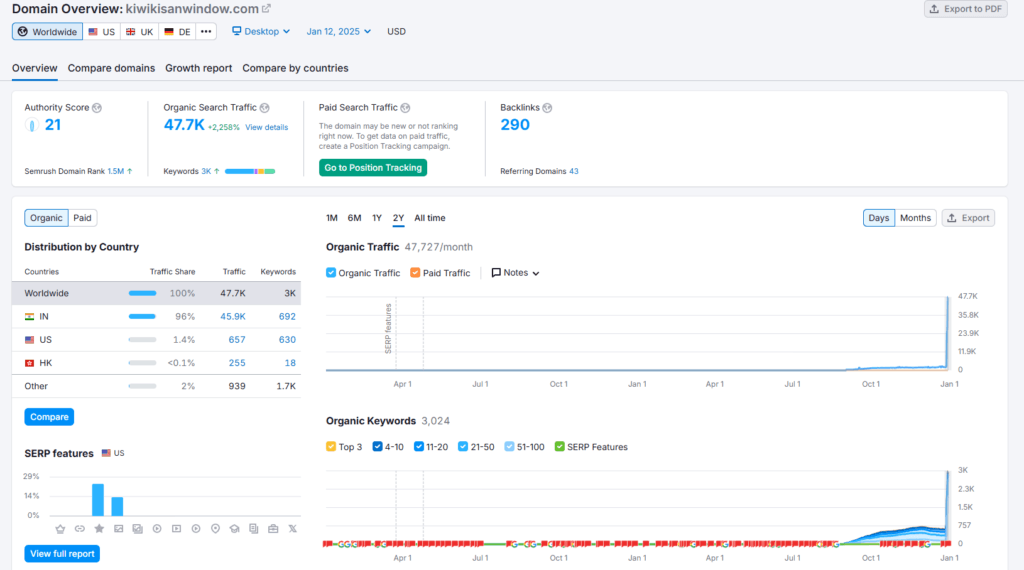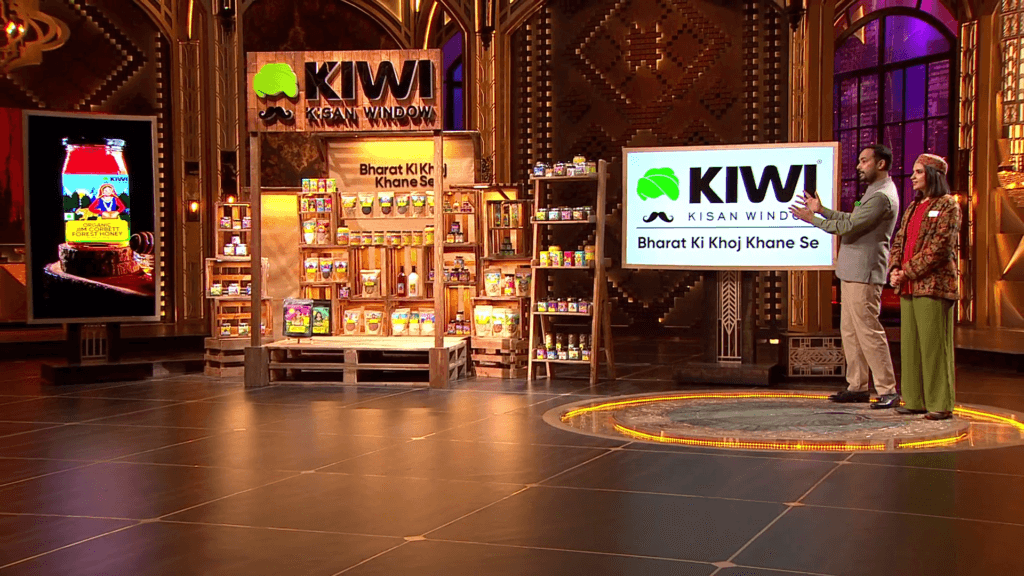KIWI Kisan Window Shark Tank India Episode Review
Website Information
- Website:- KIWI Kisan Window
- Build on E-commerce Shopify
- Advertise with Google Ads
- Good SEO performance but SEO Improvement is needed.
- ORGANIC TRAFFIC: 47.7k visitors per month.
Founder
- Nupur Agarwaal: An undergraduate from London, Nupur is committed to ethical sourcing and quality in the food industry.
- Abhinav Ahluwalia: Co-founder with a background in rural management, focusing on supporting local farmers and sustainable agriculture.

Brand Overview
- KIWI Kisan Window specializes in organic food items, providing healthy and nutritious options.
- Their product range includes pulses, pickles, dehydrated coconut chips, traditional Indian snacks, and more.
- The brand aims to create a direct connection between consumers and farmers, supporting local communities.

Shark Tank India Appearance & Ask
- In Shark Tank India Season 4 Episode 5, KIWI Kisan Window pitched their business as a one-stop shop for tasting India’s distinctive flavors.
- They valued the company at ₹50 crores and requested an investment of ₹50 lakhs for 1% equity.
Season and Episode Air Date
- Season: 04
- Episode:- 05
- Episode Air Date: Friday, 10 January 2025
Product Overview
- KIWI Kisan Window offers a diverse range of organic products categorized into healthy necessities, beverages, and snacks.
- Their items include over 150 SKUs for healthy necessities, 50 SKUs for beverages, and 50 SKUs for snacks. Most of their revenue (97%) comes from online sales.
Investor Reactions
- During their pitch, some Sharks expressed concerns about the store volume and overall financials.
- Ritesh Agarwal and Vineeta Singh opted out due to these concerns, while Aman Gupta showed interest but later modified his offer.
Customer Engagement Philosophy
- KIWI Kisan Window emphasizes direct engagement with consumers through both online platforms and physical retail locations.
- They aim to provide high-quality organic products while supporting local farmers.
Product Highlights
- Product Variety: A wide selection including pulses, pickles, dehydrated coconut chips, thepla, mukhwas, chunda, aam aachar, etc.
- Retail Presence: Operates multiple retail stores in Dehradun alongside an online store.
- Sustainability Focus: Supports local agriculture by sourcing directly from farmers.
Future Vision of KIWI Kisan Window
- The company plans to expand its retail presence to 300 outlets over the next five years while continuing to grow its online sales.
- They aim to enhance brand awareness and reach more consumers interested in organic products.
Deal Finalized or Not
- The founders ultimately accepted an offer of ₹2.5 crores for 10% equity from Kunal Bahl.
- The deal was concluded after discussions regarding the company’s valuation and previous funding rounds.

| Category | Details |
|---|---|
| Company Name | KIWI Kisan Window |
| Location | Dehradun, India |
| Website Information | Built on E-commerce Shopify |
| Advertise with Google Ads | |
| Good SEO performance but SEO improvement is needed | |
| Organic Traffic: 47.7k visitors per month | |
| Founders | Nupur Agarwaal: An undergraduate from London, committed to ethical sourcing and quality in the food industry. |
| Abhinav Ahluwali: Co-founder with a background in rural management, focusing on supporting local farmers and sustainable agriculture. | |
| Brand Overview | Specializes in organic food items, providing healthy and nutritious options. |
| Product range includes pulses, pickles, dehydrated coconut chips, traditional Indian snacks, and more. | |
| Aims to create a direct connection between consumers and farmers, supporting local communities. | |
| Shark Tank India Appearance | Pitched in Shark Tank India Season 4 Episode 5 as a one-stop shop for tasting India’s distinctive flavors. |
| Valued the company at ₹50 crores and requested an investment of ₹50 lakhs for 1% equity. | |
| Deal Finalized or Not | Accepted an offer of ₹2.5 crores for 10% equity from Kunal Bahl after discussions regarding valuation and funding rounds. |
| Product Overview | Offers a diverse range of organic products categorized into healthy necessities, beverages, and snacks. |
| Over 150 SKUs for healthy necessities, 50 SKUs for beverages, and 50 SKUs for snacks; 97% of revenue comes from online sales. | |
| Investor Reactions | Some Sharks expressed concerns about store volume and overall financials; Ritesh Agarwal and Vineeta Singh opted out due to these concerns. |
| Aman Gupta showed interest but later modified his offer. | |
| Customer Engagement Philosophy | Emphasizes direct engagement with consumers through both online platforms and physical retail locations. |
| Aims to provide high-quality organic products while supporting local farmers. | |
| Product Highlights | Wide selection including pulses, pickles, dehydrated coconut chips, thepla, mukhwas, chunda, aam aachar, etc. |
| Operates multiple retail stores in Dehradun alongside an online store. | |
| Supports local agriculture by sourcing directly from farmers. | |
| Future Vision | Plans to expand retail presence to 300 outlets over the next five years while continuing to grow online sales. |
| Aims to enhance brand awareness and reach more consumers interested in organic products. | |
| Market Growth | Indian organic food market projected to grow from USD 1,917.4 million in 2024 to USD 10,807.9 million by 2033 (CAGR of 20.13%). |
| Total Addressable Market (TAM) | Current market size valued at approximately USD 1,582.2 million in 2023; expected to reach USD 8.9 billion by 2032. |
| Ideal Target Audience | Health-conscious consumers seeking organic options; urban professionals and families interested in nutrition; environmentally conscious individuals supporting local farming practices. |
| Demographics for KIWI Kisan Window | Age: 25-45 years; Income Level: Middle to upper-middle class; Locations: Major metropolitan areas such as Delhi, Mumbai, Bangalore, Pune. |
| Marketing Strategy for KIWI Kisan Window | Leverage social media platforms, influencer partnerships, community events; develop educational content on health benefits of organic foods; introduce promotional offers. |
| Content & Digital Marketing Strategy for KIWI Kisan Window | Enhance website visibility through SEO; utilize social media for targeted advertising; send newsletters featuring product highlights and health tips. |
| Distribution Strategy for KIWI Kisan Window | Sell products through major online retailers like Amazon and Flipkart; optimize the KIWI Kisan Window website for direct-to-consumer sales; expand physical retail locations significantly. |
| Advantages | Direct sourcing from farmers ensures high-quality products; increasing consumer awareness supports market growth; diverse product range caters to various preferences. |
| Challenges | Increasing competition in the organic food sector; need for consumer education on benefits of organic foods versus conventional options. |
| Reasons for Potential Success | Rising health consciousness driving demand for organic foods; commitment to ethical sourcing aligns with consumer interest in sustainability. |
| Mitigation Strategies | Diversify product line based on consumer trends; strengthen relationships with farmers for consistent quality and supply of products. |
| Future Business Roadmap | Short-term Goals (1 Year): Increase revenue from ₹5.06 crores (FY23) to ₹10 crores by FY24; launch new product lines based on feedback. |
KIWI Kisan Window Shark Tank India Business Plan

Business Potential in India
- Market Growth: The Indian organic food market is projected to grow from USD 1,917.4 million in 2024 to USD 10,807.9 million by 2033, exhibiting a CAGR of 20.13% during this period.
- Consumer Awareness: Increased health consciousness and awareness about the hazards of chemical pesticides are driving demand for organic products. A survey found that 63% of Indian consumers are willing to pay a premium for organic food.
- COVID-19 Impact: The pandemic heightened the importance of health and wellness, leading to a surge in demand for organic food products.
Total Addressable Market (TAM) for KIWI Kisan Window
- Current Market Size: The organic food market in India was valued at approximately USD 1,582.2 million in 2023, with expectations to reach USD 8.9 billion by 2032.
- Growth Segments: Organic cereals and food grains represent the largest segment due to rising demand for plant-based foods. Online sales are the fastest-growing segment within the market.
Ideal Target Audience and Demographics for KIWI Kisan Window
- Target Audience:
- Health-conscious consumers seeking organic and sustainable food options.
- Urban professionals and families interested in nutrition and wellness.
- Environmentally conscious individuals supporting local farming practices.
- Demographics:
- Age: 25-45 years
- Income Level: Middle to upper-middle class
- Locations: Major metropolitan areas such as Delhi, Mumbai, Bangalore, and Pune.
Marketing Strategy for KIWI Kisan Window
- Brand Awareness Campaigns: Leverage social media platforms, influencer partnerships, and community events to promote organic products.
- Educational Content: Develop content that educates consumers about the health benefits of organic foods and responsible farming practices.
- Promotional Offers: Introduce discounts or bundle deals to encourage trial purchases.
Content and Digital Marketing Strategy for KIWI Kisan Window
- SEO Optimization: Enhance website visibility through improved SEO strategies to increase organic traffic.
- Social Media Engagement: Utilize platforms like Instagram, Facebook, and Twitter for targeted advertising and community engagement.
- Email Marketing Campaigns: Send newsletters featuring product highlights, health tips, and promotions to foster customer loyalty.
Distribution Strategy for KIWI Kisan Window
- E-commerce Platforms: Sell products through major online retailers such as Amazon, Flipkart, and BigBasket to reach a wider audience.
- Direct Sales via Website: Optimize the KIWI Kisan Window website for direct-to-consumer sales with an easy-to-navigate interface.
- Retail Presence: Expand physical retail locations from eight stores to a target of 300 outlets over the next five years.
Advantages for KIWI Kisan Window
- Quality Assurance: Direct sourcing from farmers ensures high-quality organic products.
- Growing Market Demand: Increasing consumer awareness about health benefits supports market growth.
- Diverse Product Range: A wide variety of products caters to different consumer preferences.
Challenges
- Market Competition: The organic food sector is becoming increasingly competitive with established brands.
- Consumer Education: Efforts are needed to educate consumers on the benefits of organic foods versus conventional options.
Reasons for Potential Success
- Health Trends: Rising health consciousness among consumers is driving demand for organic foods.
- Sustainable Practices: Commitment to ethical sourcing aligns with growing consumer interest in sustainability.
Mitigation Strategies
- Diversification of Product Line: Expand product offerings to include more varieties of organic foods based on consumer trends.
- Partnerships with Local Farmers: Strengthen relationships with farmers to ensure consistent quality and supply of products.
Future Business Roadmap
Short-term Goals (1 Year):
- Increase revenue from ₹5.06 crores (FY23) to ₹10 crores by FY24 through enhanced online sales and marketing efforts.
- Launch new product lines based on consumer feedback.
Medium-term Goals (2–3 Years):
- Expand retail presence significantly by opening additional stores across key metropolitan areas.
- Develop strategic partnerships with health organizations for co-marketing initiatives.
Long-term Goals (5 Years):
- Achieve a market leader position in the Indian organic food sector by leveraging brand reputation and customer loyalty.
- Explore international markets for expansion based on success in India.



KIWI Kisan Window Shark Tank India Episode Review